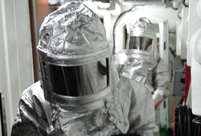BEIJING-- In near future, in outer space, Chinese scientists and their international colleagues, perhaps in the company of robots, will seek knowledge in labs on China's future space station.
Aboard the space station, deep in space, researchers will probe the profound mysteries of the universe, while explorers penetrate the darkness beyond both Moon and Mars.
This is no sci-fi movie, but a vision of the future presented to the people' s congress and members of the CPPCC during the two sessions. The vision is of a "space odyssey" for China' s future and for space exploration.
CHINA'S FUTURE SPACE STATION
By the year of 2020, the International Space Station is expected to be retired, while, in that same year, China's space station should be complete. China's station may then be mankind's only foothold in space.
Zhang Bonan, chief designer of the program, told Xinhua that the station will be multi-cabin with a large capacity and high power. "The 2020 space station will be a national space lab," Zhang said.
"Experiments there will be diverse and flexible," he said, "International cooperation will be encouraged and the door of the lab will open for any experiments that fit the requirements."
NEW FLIGHT SYSTEM
The first step to the stars is new technology, principally in supply lines. A cargo ship named "Tianzhou" (Heavenly Vessel) is planned to ferry cargo back and forth to the station.
China is expected to launch a cargo ship around 2016 to serve the Tiangong-2 space laboratory, said Zhou Jianping, chief designer of the manned space program and member of the National Committee of the CPPCC.
The cargo ship will be delivered into space by the new Long March-7 carrier rocket and dock with Tiangong-2 automatically, Zhou said.
A cargo transportation system that supplies goods and propellants is key to China building its own space station, he said.
Liang Xiaohong, Party chief of the China Academy of Launch Vehicle Technology, also a member of the National Committee, explained that the Long March carrier rocket series is already industrialized. By 2020, China will meet a market demand of more than 270 domestic and 460 foreign launches.
The Tianzhou cargo ship and the Long March rocket will be ready around 2016, heralding a new era in space transportation. Moreover, China is expected to launch a "space shuttle bus" this year to carry payload.
The "space shuttle bus", Yuanzheng-1 (Expedition-1) is an upper stage aircraft attached to a carrier rocket. It can carry spacecraft, using its own power, into an initial orbit, Liang Xiaohong said. It has the same function as a carrier rocket and can take multiple craft to different locations, Liang said.
Yuanzheng-1 will play an important role in future moon and Mars exploration as well as orbital transfer and space debris clearing, he said.
 |
 Chaihe village, pure and peaceful fairyland in snow
Chaihe village, pure and peaceful fairyland in snow Belgians warmly welcome arrival of China's giant pandas
Belgians warmly welcome arrival of China's giant pandas Female marines receive tactical training in NW China
Female marines receive tactical training in NW China Blood memory: Nanjing Massacre in 1937
Blood memory: Nanjing Massacre in 1937 Top 10 pure beauties in showbiz
Top 10 pure beauties in showbiz British WWII veteran: I can't forgive Japan
British WWII veteran: I can't forgive Japan Tongban's dream of prosperity
Tongban's dream of prosperity Chinese frigate Yancheng holds drills in Mediterranean Sea
Chinese frigate Yancheng holds drills in Mediterranean Sea A visit to comfort woman's home in South Korea
A visit to comfort woman's home in South Korea Fairyland? Qingdao in sea of clouds
Fairyland? Qingdao in sea of clouds Top 10 most handsome faces in Asia in 2013
Top 10 most handsome faces in Asia in 2013 Female celebs with beautiful long legs
Female celebs with beautiful long legs Cat 'guardians' in Forbidden City
Cat 'guardians' in Forbidden City Large numbers of ancient coins excavated in Inner Mongolia
Large numbers of ancient coins excavated in Inner Mongolia Leisurely life beneath Zhonggulou, where time travels slower
Leisurely life beneath Zhonggulou, where time travels slowerDay|Week|Month